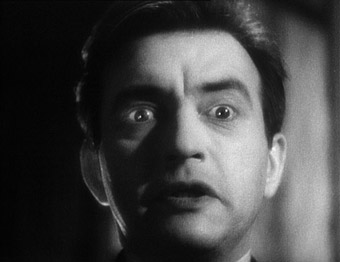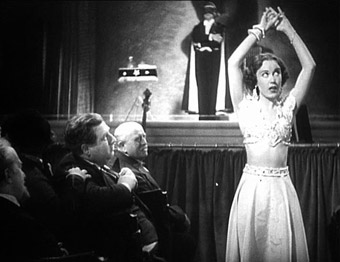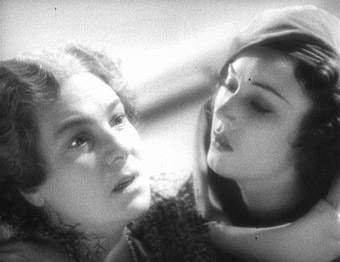| |
"Clairvoyant, n.: A person, commonly a woman, who has the power of seeing that which is invisible to her patron – namely, that he is a blockhead." |
|
Ambrose Bierce – The Devil's Dictionary, circa 1881 |
It's amazing how many people still believe in clairvoyance and its associated mumbo-jumbo, particularly given that its deceit and trickery have long since been exposed. If you're still under the delusion that those sincere-sounding charlatans who sit on a stage and ask you if the name Doris means anything to you are actually reading your mind, then do a Google search on the term 'cold reading'. You'll even find a few handy guides on how to do it yourself if you want to make a few pence exploiting the gullible.
Just such a figure is Maximus (Claude Rains), a small time mind-reading act who is about to make his British music-hall debut. He's revealed as a fake from the opening scene, where he's still trying to learn the coded phraseology that his wife Rene (Fay Wray) will use to identify objects she will borrow from the audience. Initially the act goes rather well, but when Rene attempts to make her way to the circle seats, she walks through the wrong door and locks herself out of the theatre and the audience take to mocking the blindfolded mentalist. Then suddenly he begins to have a genuine vision, one that enables him to accurately read the contents of a letter held by a scornful heckler. What he doesn't immediately realise is that this dormant power appears to have been awakened by the presence of audience member Christine Shawn (Jane Baxter).

It's the nature of cinema's suspension of disbelief that even us skeptics will accept that such powers are real within the confines of a film and dismiss those who doubt them as misguided fools. Thus when Max stops a train on which he is travelling and demands to be let off because he has foreseen it will crash, we know that he's right and that if we were there with him we'd jump off too. One passenger who does is Christine Shawn, who is coincidentally travelling in the same carriage as Max and who once again appears to have triggered his vision. Just as well, as a short while later they reach a signal box and are met with the news that the train has collided with another.
This incident catapults Max into the media limelight and he is able to command an extraordinary fee (£300 a week!) to perform his act, but five days in he's failing to deliver the goods and the management want to give him the boot. However, another visit from Christine prompts him to predict the Derby winner and in no time at all he's the toast of the town. The mystery potential of Max's new-found gift is then put on hold for some family melodrama, as Christine becomes increasingly attracted to Max, Rene becomes jealous and deeply upset, and Max is too wrapped up in himself to realise. Rene packs her bags and makes moves to leave, but is halted by Max's mother (Mary Clare), who, in a beautifully framed and intimate two-shot, asks Rene to convince Max to renounce his gift and advise trigger-girl Christine to take a hike. But will Max choose the welfare of his family or be seduced by the self-destructive nature of his new-found power?
Built around a neat and much imitated concept, The Clairvoyant plays out entertainingly as a series of personal highs and lows, as the visions come and go and Max takes an age to realise that they only occur when Christine's around. This reaches a dramatic and budgetary climax when he predicts a disaster at the Humber mine shaft, which he tries to prevent by going to the mine and warning the workers. Unfortunately for them, they have the sort of boss that David Cameron would be proud of, one who threatens to fire anyone who refuses to work, and they thus enter the mine in spite of the warning. Inevitably Max's prediction comes true, but to everyone's surprise Max is arrested and charged with the quaintly English crime of 'public mischief'.

It's here that the film is at its most thematically interesting, as the prosecuting council suggests that, far from predicting future catastrophe, Max is actually its cause, inciting accident-triggering panic in the Humber Shaft and predicting a train crash that only occurred at all because its journey was interrupted to allow him and his companions to disembark. It's a shame this aspect was not more fully developed, as there's serious potential in the concept of visions as self-fulfilling prophecies that prove to be the cause of the very events they predict. Hey, I'm liking it more by the second.
But The Clairvoyant was made in 1935, and by this point in the story the film is busy steering its characters towards the happy ending and familial reconciliation that the public still seem to expect to this day. As a mystery drama it largely delivers, balancing some uneven plot development with lively banter and nicely observed character detail. Still relatively fresh from his faceless lead role debut in James Whale's The Invisible Man, a sometimes over-made up Claude Rains is enjoyably theatrical as Max, but it's the trio of women in his life – Fay Wray as Rene, Jane Baxter as Christine and Mary Clare as Max's mother respectively – who quietly emerge as the backbone of the film. It's also impressively shot by Glen MacWilliams and very smartly edited by Paul Capon, skills that really shine in Humber shaft flood, where for a few memorable seconds this small scale drama borders on the spectacular.
1935 was a long time ago and prints from that period are often in bad shape. This much we know. What we have become used to in the digital age is seeing films from even the early days of cinema being restored and remastered for DVD or Blu-ray release. The results have sometimes surpassed expectations, with the Masters of Cinema Blu-ray of Murnau's 1930 City Girl a benchmark against which all others are judged. The print used for Odeon's DVD of The Clairvoyant has not undergone such extensive restoration, or, it would seem, any restoration at all. Soft on detail and peppered with dust spots, scratches and other sundry damage, the picture has been degraded further by digital enhancement and a contrast boost that sucks detail into the blacks and bleaches out highlights – you'll be able to read the train crash headline on the held-up newspaper, but little else.

It's a similar story with the soundtrack, a Dolby 2.0 mono mix whose understandably narrow range is enlivened by an intermittent background hum, several small pops and plenty of crackle, rendering some stretches only a snap short of a fresh bowl of Rice Crispies.
If you like old trailers you're in for a treat, as the only extra here are seven trailers for other titles in Odeon's 'Best of British' collection. But that's it.
An enjoyable and well made mystery drama with standout sequences and lively performances whose DVD release is let down by the condition of the original source print – which is perhaps understandable – and some aggressive contrast and edge enhancement – which isn't. Bummer.
|